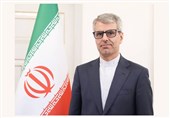Geneva Talks Break Anti-Iran Political Atmosphere
TEHRAN (Tasnim) – An Iranian lawmaker on Wednesday hailed the recent deal reached between Iran and six world powers in Geneva, saying it has helped break the hostile political atmosphere against Iran and provide a breathing space for the economy that has been under tough sanctions for a long time.
“We should believe that the negotiations have had positive results and broken the political atmosphere against the Islamic Republic of Iran,” MP Javad Jahangirzadeh said after Zarif’s nuclear address in parliament.
“But there are comments about the matter, which are natural, such as the Israeli prime Minister Netanyahu’s remarks and the contradictory stands of the Americans - a sign that there have been openings in the political atmosphere,” he added.
Israel's prime minister, Binyamin Netanyahu, has called the Geneva agreement an "historic mistake." He announced on Monday that he would be sending a team to Washington to discuss the Iran deal.
"I spoke last night with President Obama. We agreed that, in the coming days, an Israeli team led by the national security adviser, Yossi Cohen, will go out to discuss with the United States the permanent accord with Iran," he said.
Jahangirzadeh described the return of calm to the country's economy, a halt to new sanctions on Iran and failure of influential lobby groups as the positive outcomes of the interim deal, adding that all the achievemnets were made while no redlines were crossed.
He appreciated “the revolution’s offsprings” – an expression used by the Supreme Leader in reference to the Iranian nuclear negotiation team – noting that these talks have had a series of positive effects for Iran, and there have been certain obligations associated with them.
In a live address on state television on Tuesday night, Iran's President Hassan Rouhani said that enrichment is a right not banned under international law and Tehran will never stop the activity inside the country.
“Enrichment, which is one part of our nuclear right, will continue, it is continuing today and it will continue tomorrow and our enrichment will never stop and this is our redline,” Rouhani said during the address to mark his 100th day in office.
Iranian Foreign Minister Mohammad Javad Zarif has voiced the country’s readiness to take the required measures to dispel the possible misgivings of other countries over Tehran’s peaceful nuclear program.
His comments came as Iran and the G5+1 countries (also known as the P5+1 in diplomatic shorthand) signed a six-month deal on Tehran’s nuclear program following three rounds of intensive negotiations in the Swiss city of Geneva on November 24.
Zarif said a final agreement between the two sides would take one year to reach, but added that Tehran seeks to finalize the agreement within the next six months.
“What Iran will do in the final steps would be dispelling the concerns over Iran’s nuclear program, and we are ready to take whatever measures to remove the concerns,” the minister explained.
France's foreign minister, Laurent Fabius, has said EU ministers would discuss the lifting of partial sanctions as early as December and that a "Europe-wide" decision was necessary for easing some of the punitive measures that the EU has imposed on Tehran.
Also, Michael Mann, spokesman for EU foreign policy chief Catherine Ashton, has talked of a proposal for the easing of a limited number of sanctions on Iran.
“I cannot say at this point exactly when the initial decisions on this would happen - it could be in December, it could be in January,” he added.
He said the EU experts should prepare the draft amendment to the sanctions legislation that must be endorsed by the EU foreign ministers later.






